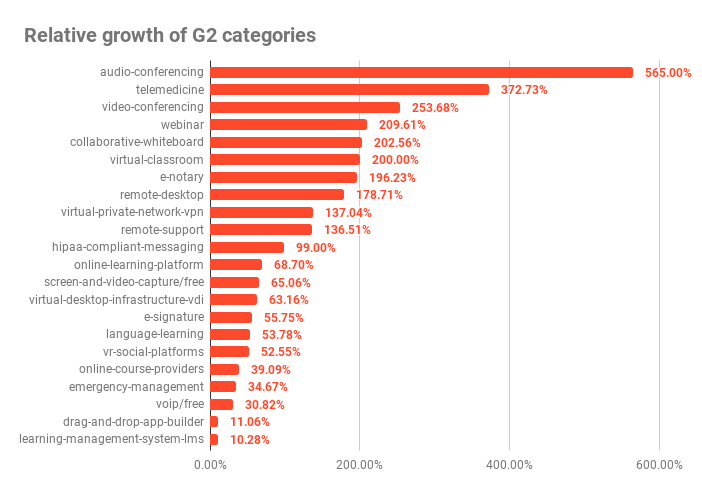The coronavirus crisis is the biggest disrupter of our lives in the 21st century.
It is challenging our health, our economy, and millions of businesses.
As we try to stop the spread of the virus by staying at home, a new wave of attention is given to software, and the internet that is bigger than anything we’ve seen before. As the world’s biggest marketplace for software, we have unique data that helps us visualize this historic shift.
Remote software is eating the world
Ten years ago, we saw software eating the world. Every job that could be solved with software, would be.
That still holds true today, but we’re witnessing the next step of the evolution: remote software is eating the world. Every job that can be done remotely and every service that can be delivered will be.
This time, it’s not a technology that drives this change but consumer behavior. Working from home was a nice-to-have, now it’s a necessity. Our data shows that some of our category leaders are seeing massive growth.

But the world isn't just working from home.
We have seen four big trends on G2's software marketplace:
- Remote work
- Remote learning
- Remote entertainment
- Remote services
These trends are supported by sharp increases in internet usage. Roughly 5 billion people have a mobile phone, and Cloudflare reported that Italy saw an increase of 20-40% online traffic. Cities like Amsterdam, London, and Frankfurt increased by 10-20% on March 9, 2020 alone.
Remote work is growing by magnitudes
It comes as no surprise that remote work software is trending, and will be for the foreseeable future. The growth of audio and video conferencing amid the coronavirus crisis is expected. However, the need for whiteboarding, remote support software, and VPNs only now really comes to fruition.
Google shows a demand for remote work, remote jobs, and working from home that makes the last five years look like the topic was nothing.
The demand for remote work is massively higher than everything we’ve seen before
The demand for video conferencing in the US was declining between March 2005 and March 2020.
When we zoom in on the software terms “video conferencing software” and “best video conferencing software,” we see the same trend.
Mary Meeker’s 2019 Internet Trends report shows a small improvement from 3% to 5% remote workers in the last 20 years (slide 229). The coronavirus changed that.
Now, Google Trends shows a huge worldwide spike:
It doesn’t matter whether you call it video “conferencing software,” “web conferencing software,” or “video call software”.
The trend goes so far that our video conferencing category leader, Zoom, is now worth a multiple of Uber.
Stock comparison between Uber and Zoom
The top three leaders in our video conferencing category all see immense online demand.
People don’t blindly install the most popular software; rather, they compare solutions and prices on G2. Our organic search traffic from comparison keywords, alternative, and pricing keywords has exploded.
|
Query
|
Relative difference
|
|
zoom alternative
|
409%
|
|
how much does zoom cost
|
1645%
|
|
how much is zoom
|
738%
|
|
zoom alternatives
|
519%
|
|
google meet vs zoom
|
274%
|
|
zoom review
|
900%
|
|
zoom pricing
|
607%
|
|
zoom vs google meet
|
326%
|
|
whereby alternative
|
1000%
|
|
whereby vs zoom
|
778%
|
|
zoom cost per month
|
636%
|
|
zoom competitors
|
85%
|
Telemedicine and remote medical consulting see a breakthrough
Telemedicine is not new, but breaks through as alternative to in-person doctor visits in time of the coronavirus.
This is telemedicine before the coronavirus spike:
This is telemedicine including the last two weeks:
The demand of HIPAA compliant messaging solutions, which enables health care providers to communicate with their customers, doubled on our site. Customers and businesses are looking for solutions and adjacent products that enable them.
The opportunity for online learning, fitness, and entertainment
People are seeking ways to stay mentally sharp in these times. Learning management systems like Google Classroom and online learning platforms like Udemy help people to learn, but also re-skill and upskill for the coming recession.
People want to use the time to develop themselves. Part of that is making sure children keep busy learning while schools are closed so parents can work.
But people also want to stay sharp physically. The demand for online fitness and workouts you can do at home has seen a strong increase.
We’re also noticing a 52% increase in the traffic to our VR social platforms category. Virtual reality entertainment is still in the early stages, but we see a lot of demand for streaming platforms in the entertainment category on Google Trends.
The future is remote
As the famous proverb states, “Necessity is the mother of invention."
More industries will find ways to bring their offering online. On the horizon, we see categories like home fitness, tutoring, and live streaming of classes and courses.
Like every crisis before, the coronavirus crisis will give birth to new trends, behaviors, and technology. What we are seeing is the very beginning of the biggest change in consumer behavior since broadband internet.
Every business will have to ask itself how they can serve people remotely, whether through video conferencing, delivery, or other cloud-based services.
If your company is looking for ways to save money, find out how real customers used G2 Track to cut costs during COVID-19.
 by Dean Radcliffe
by Dean Radcliffe
 by Sophia Bernazzani
by Sophia Bernazzani
 by Rimzhim Dubey
by Rimzhim Dubey